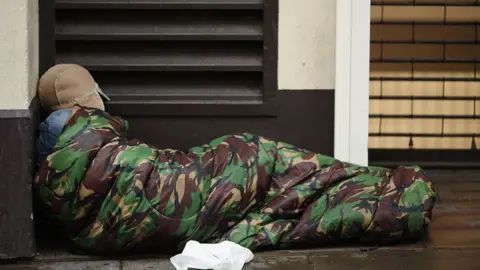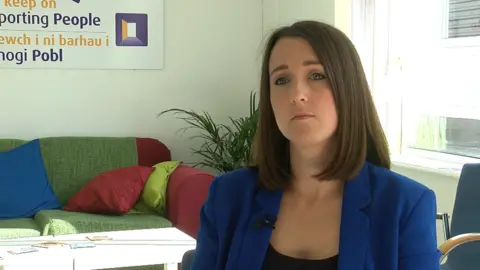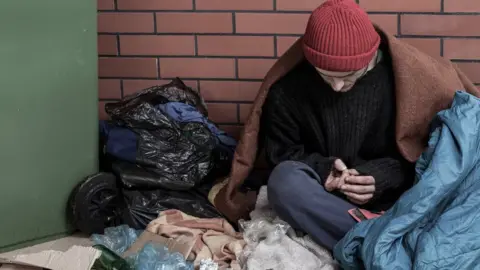Homeless people struggle to access healthcare, report says
 Getty Images
Getty ImagesHomeless people are struggling to access healthcare, according to a new Wales-wide report.
A third of people surveyed by housing charity Cymorth Cymru said health problems contributed to them losing their home.
Seven recommendations have been made to health boards, landlords and councils to ensure better support.
The Welsh Government said it welcomed the report and would consider its recommendations.
The charity - an umbrella body for providers of housing support and social care services - analysed responses from 332 homeless people from 21 out of 22 local authority areas.
It was commissioned by the Welsh Government to look at the experiences of people who had slept rough, stayed in a hostel or B&B, stayed with friends or relatives, or applied to the council as homeless.
A third of the sample stated their homelessness was caused, at least in part, by a health problem, when drug or alcohol problems were included as part of a broadly defined health issue.
Nearly a quarter who were admitted to hospital said they were discharged to the streets or "unsuitable accommodation".
More than two-thirds of respondents had not had a hepatitis B or flu vaccination and half the eligible female respondents did not have cervical smears or breast examinations on a regular basis.

Waiting times, the inability to make an appointment, as well as drug and alcohol problems are some of the factors which prevent people from accessing health services, the report said.
Cymorth Cymru director Katie Dalton said the results suggested poor health was a cause as well as an effect of homelessness.
"People can start to experience a physical or mental health problem and that can impact on their ability to engage in employment - they could see their income reduce or stop, not be able to afford their rent or mortgage and lose their home," she said.
"We know that around 30% of people who are homeless saw their health get worse in the past 12 months and that many of them face barriers to accessing a range of health services that could have prevented that deterioration from happening."

 Thinkstock
ThinkstockRecommendations
- Medical professionals should pilot outreach services for people experiencing repeat or long-term homelessness, while councils should check if health needs are met as part of their homelessness service
- Consider introducing a "Don't let go service" - where one person coordinates health and housing needs to avoid people getting lost in the system
- Health boards should ensure people are not "bounced" between mental health and addiction services
- New approaches for people with the most complex needs
- Consider placing housing and homelessness staff on hospital wards and GP surgeries, while staff with mental health expertise could be placed in housing departments
- Ensure all patients have their housing needs assessed before discharge from hospital
- Welsh Government and Public Health Wales should monitor what's being done to improving the health and well-being of homeless people

Ms Dalton added: "It's really important that we think more creatively to improve those health stats in future… this isn't necessarily about more resources - it's about being smarter.
"Significant proportions of homeless people use emergency departments and ambulances to access hospital - we believe that if early intervention was working, those people could be prevented from needing those services and reduce pressure on the NHS.
"We actually found that 63% of people who filled out the questionnaire didn't have a drug or alcohol problem - that's probably in contrast to what public perception is around substance misuse."
A Welsh Government spokesman said: "We continue to work closely with Public Health Wales, health boards, local authorities and homelessness organisations to ensure appropriate services are planned and delivered to meet the health needs of homeless people and those at risk of homelessness."
